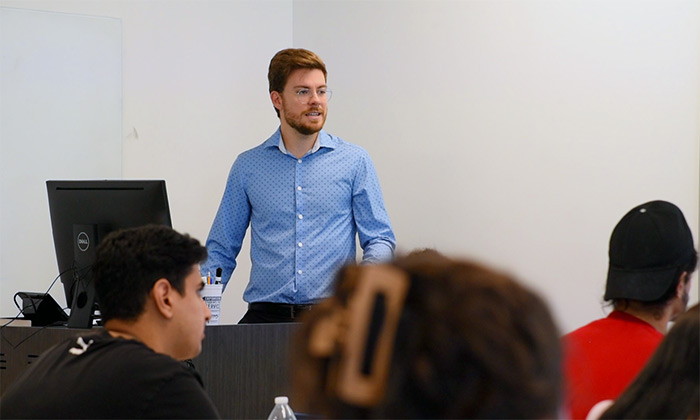In this episode of “Faculty in Focus,” we interview Dr. Alvaro Cintas-Canto, Assistant Professor of Cybersecurity and Artificial Intelligence (AI) within the College of BILT, to discuss his diverse passions within the realm of AI, the benefits of ChatGPT and his efforts to help others integrate themselves into the high-tech world.
Why Marymount?
I chose Marymount because I find myself doing best when the classrooms are smaller. I get to interact more with the students. I also like the core values of Marymount and what we are trying to do. Lastly, I love the area Marymount is in, right next to Washington, D.C., which is right near where I live.
How has your teaching style changed over the years?
When I came here, I initially had a very technical background. Initially, my teaching was more theory-based, which might have been boring for some students. Thus, I’ve been trying to implement a lot of hands-on experience and provide little bonuses in classes to get the students engaged. I want to make sure that they understand what they are doing and make the assignments in class both educational and exciting.
What do you hope students learn from your classes?
Every semester, I have a little presentation about the syllabus and an introduction to the class. One of the requirements that I always highlight is that I hope they enjoy the class. For me, this was always in the back of my mind when I was a student. I would enjoy and have more interest in a class with projects that gave me some freedom to solve real-world problems. I try to do that with my teaching — I want my students to feel like they are accomplishing something and that they find the value of my class outside of the classroom.
What originally got you interested in artificial intelligence?
There are two areas that I’m passionate about — one is automation, which in a way helps reduce repetitive tasks, and the other area is health care. I think AI can help save lives or make people’s lives better. We already have seen some examples over the years, such as detecting eye diseases or discovering different drugs. I believe AI is going to help in a lot of those areas, not only in academia but in numerous fields.
What has been a standout achievement from your work in artificial intelligence?
At the beginning of this year, I started sharing AI insights — different tips and tricks on Twitter, now called X, to educate a big community on the advantages of AI. My goal was to transform something that sounds very technical and not straightforward into something simpler — being able to reach a wider audience and explain why AI can be beneficial for us. Because of all this, I was able to get an article published in Forbes — which might sound silly, but it has always been my dream since I was little. I always saw Forbes as such a big achievement.
What is something about ChatGPT that we might not know about?
ChatGPT can pretty much be implemented into every field, and there are many things that many people don’t know about it. Most people just think that it’s like a robot, and that you can just ask whatever and you will get a limited and robotic answer. However, there are many different tips and tricks — like, for example, making it sound less “robotic.”
One thing that I find the most helpful is that you can teach ChatGPT to write in your own style. Usually, the first thing that is recommended is to give it a role. Then, after giving ChatGPT a role, you give it a task to perform. Then, to implement your own writing style, you can say: “I want you to analyze this piece of text which has my own writing style, tone, voice, etc.” and it would write its answer in your own voice. Many people solely use single-sentence prompts, but you can actually have many sentences in ChatGPT to make your answers more specific and have better outputs.
Sometimes with ChatGPT, there will be a lot of repeated prompts. To prevent this from happening, you can type those specific instructions into a little box called custom instructions, and then ChatGPT will remember that for all of your conversations. For instance, ChatGPT sometimes cannot do some specific tasks, and it will say: “As an artificial intelligence…,” giving you the same repetitive answer all the time. To avoid this, you can write in the custom instructions box: “Do not provide me as the answer: ‘As an artificial intelligence…'” Custom instructions can be helpful for everybody, and it can save you time by not having to repeat the same answer over and over.
For ChatGPT tips, can these be used outside of the professional workplace?
I believe it’s applicable for everybody, but there are some caveats to this. For example, if you have a stricter schedule, it might be a little bit harder to apply those time management tips to your particular schedule. You can certainly still apply some of those tips to your life, though. There are specific cases where ChatGPT might not feel like the most useful tool for that specific use case, but I will say that at the end of the day, everybody has a busy schedule and we are trying to make it as optimal as possible for us.
What do you hope to achieve this academic year?
I like to dream big. The first goal would be getting a specific grant on lightweight cryptography and AI, which I’m very passionate about because it falls into the medical/health care area. I hope to publish more journal articles since I’m very passionate about not only teaching but also research. I hope I can keep bringing the world of AI and cybersecurity to both the novice and the super-technical people in classes and through social media, with the goal of continuing to close the bridge between the two. Finally, if I had another Forbes article published, that would be amazing!
Any final comments on artificial intelligence?
I would say that if you are a little bit afraid of using artificial intelligence, start exploring. You might think it is not helpful or that you cannot have any improvement in your life because of it, but many people are skeptical at first and then they end up thinking, “okay, AI is actually helping me save ‘x’ amount of hours.”
To learn more about Dr. Cintas-Canto’s work, click here.






